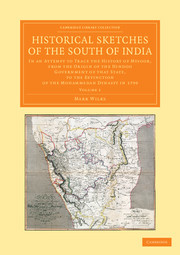Description
Historical Sketches of the South of India
In an Attempt to Trace the History of Mysoor, from the Origin of the Hindoo Government of that State, to the Extinction of the Mohammedan Dynasty in 1799
Historical Sketches of the South of India 3 Volume Set Series
Author: Wilks Mark
A three-volume history of Mysore from early times to its fall to the British in 1799, first published 1810–17.
Language: English
Subject for Historical Sketches of the South of India:
Approximative price 68.81 €
In Print (Delivery period: 14 days).
Add to cart
Publication date: 03-2013
Support: Print on demand
Support: Print on demand
Description
/li>Contents
/li>
Classically educated, Mark Wilks (c.1760?1831) joined the Madras army of the East India Company and would go on to serve as political resident at the court of Mysore from 1803 to 1808. He also later served as governor of Saint Helena from 1813 to 1816, during which time he witnessed the arrival of Napoleon Bonaparte. Elected to the Manx parliament in 1816, Wilks became its speaker in 1826 and was elected a fellow of the Royal Society in the same year. Drawing on state records and his own experiences, he first published this acclaimed three-volume history of the kingdom of Mysore between 1810 and 1817. Volume 1, an 1820 reprint of the 1810 original, covers the early Hindu dynasties, the Mughal period, the emergence of a separate Mysore under Hyder Ali (c.1720?82), and early French and British dealings in southern India to 1767.
Preface; 1. Reflections on the imaginary happiness of the early ages; 2. Romantic origin of the Hindoo house of Mysoor, and change of religion; 3. Critical period in the affairs of Mysore; 4. Former exclusion and present accession of Chick Deo Raj; 5. Preliminary observations; 6. Changes introduced by Chick Deo Raj into the conditions of the landholders; 7. Canty Reva Raj, son of the late raja, born deaf and dumb; 8. Mohammed Ali sends an ambassador to the raja of Mysore; 9. Military operations in the province of Arcot; 10. Mutiny of the army to the capital; 11. Retrospect continued; 12. Circumstances which led to the march of Basalut Jung to the south.
© 2024 LAVOISIER S.A.S.




